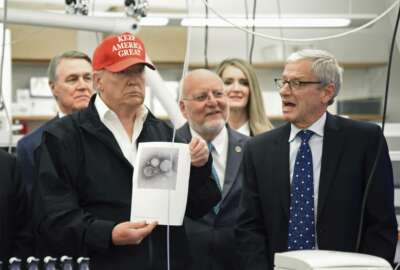
Telework during a coronavirus outbreak? Not usually an option for classified federal workers
In the event secure, classified federal facilities must close due to a coronavirus outbreak, federal employees and contractors should continue to get paid, the...
Best listening experience is on Chrome, Firefox or Safari. Subscribe to Federal Drive’s daily audio interviews on Apple Podcasts or PodcastOne.
Though many agencies have explained how their employees will continue mission-critical work during a potential COVID-19 outbreak, the classified federal workforce has far fewer options.
Recent guidance from the Office of Personnel Management described how eligible federal employees can telework, while non-eligible employees who are forced to stay home and quarantine will receive paid “weather and safety” leave.
But for federal employees and contractors who perform classified work for their agencies, telework may not be an option for COVID-19, the illness caused by the current strain of the coronavirus.
“Classified work has to be done in secure work spaces. You can’t do classified work on your laptop in your living room,” Larry Hanauer, vice president for policy at the Intelligence and National Security Alliance (INSA), said in an interview. “If secure government offices close, then it might not be possible for either government employees or contractors to come into work.”
Closing large, classified federal facilities may idle agency employees and contractors. The Director of National Intelligence, who serves as the security executive agent for all of government, should issue guidance explaining how agencies with classified workforces can and should prepare, INSA said.
And if these secure, classified spaces are forced to close due to a coronavirus outbreak, cleared federal workers and contractors should continue to receive their pay and benefits, the association said.
Some contractors are still reeling from the 35-day government shutdown. Congress ultimately approved back pay for federal employees but never provided relief for the contractor workforce. Members of Congress have introduced legislation to pay federal contractors — particularly low-wage workers — after the shutdown, but lawmakers haven’t passed any such bill.
Read more Workforce news
“It’s not just that this is fair or equitable, it’s that if contractors are seen as a second-tier of the trusted workforce, it’s going to be difficult for companies to recruit and retain the skilled personnel that they need to support government missions,” Hanauer said.
In the event classified facilities close and federal employees and contractors do lose their pay and benefits for a period of time, security clearance holders shouldn’t be penalized, INSA said.
Missing mortgage or credit card payments usually triggers a red flag for security clearance holders, who must be in good financial standing in order to retain their “trust” with a federal agency.
“Since any closure because of the coronavirus wouldn’t be any fault of the worker, we would encourage the DNI … to issue some instructions,” Hanauer said. “Any financial difficulties people incur as a result of a coronavirus-related work stoppage shouldn’t be treated as a derogatory factor when reviewing their security clearance.”
To date, INSA said it hasn’t seen any such guidance on these topics.
In addition, classified workers need more guidance on how their agencies may adapt to sudden closures of secure federal facilities, INSA said.
“Certainly some cleared workers, government employees and contractors both, will likely have to go into workplaces even if there is a risk of infection from the coronavirus, because national security missions can’t be entirely disrupted,” Hanauer said. “In that case hopefully meetings can be replaced with secure video conferences or secure conference calls.”
Classified workers may, for example, have to conduct their work from another secure facility — in the event their normal duty station is closed.
Copyright © 2025 Federal News Network. All rights reserved. This website is not intended for users located within the European Economic Area.
Tom Temin is host of the Federal Drive and has been providing insight on federal technology and management issues for more than 30 years.
Follow @tteminWFED





